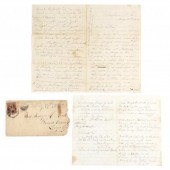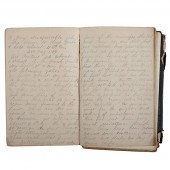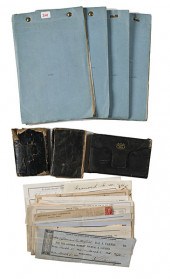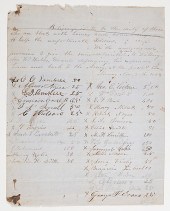Pricing Guides & Dictionary of Makers Marks for Antiques & Collectibles

A few examples of appraisal values for
WE LAY
Search our price guide for your own treasures
-
 UNION SOLDIER'S LETTER HOME AFTER
UNION SOLDIER'S LETTER HOME AFTER HIS FIRST FIGHT IN NORTH CAROLINA Autograph Letter Signed Wallace Hall, New Bern, NC, May 17, 1862, 7 pp., 8vo, to his mother, Mary D. Hall, Barnes Corners, Lewis County, New York, reading, in part, "...We were Sixteen days coming to New Bern we layed in the harbor at Fortress Monroe a day or two...I saw a rebil Bot come up that they thought was the Marymac...I saw the Monitor & the Iron clad bot lay in the harbor...she kept out of reach...we went toward Trenton (NC) the distance 20 miles...when we came on the pickets. There was two companies of Infantry & some cavalry...the bullets began to fly...they would skulk in the woods & blaze a way at us we took three prisoners & killed eight or ten. They took five prisoners & one was a Lieutenant & shot one of our majors through the shoulder & a number more of our men was shot one was shot in the hand one had his arm almost cut off with a saber and a number more wounded, we came back to Newbern the next night & last night the biggest part of them was out again...Newbern is the pleasantest place I think I ever was in...I have been into Cedar Grove Cemetrie where was found in one of the vaults $40,000 Dollars in specie there is a good many soldiers buried there on both sides...Direct to Wallace Hall Co. "G" 3d N. Y. V Cavalry New Bern N.C. In care of Capt Hull.... The letter concludes with a patriotic verse, likely composed by Hall.
UNION SOLDIER'S LETTER HOME AFTER
UNION SOLDIER'S LETTER HOME AFTER HIS FIRST FIGHT IN NORTH CAROLINA Autograph Letter Signed Wallace Hall, New Bern, NC, May 17, 1862, 7 pp., 8vo, to his mother, Mary D. Hall, Barnes Corners, Lewis County, New York, reading, in part, "...We were Sixteen days coming to New Bern we layed in the harbor at Fortress Monroe a day or two...I saw a rebil Bot come up that they thought was the Marymac...I saw the Monitor & the Iron clad bot lay in the harbor...she kept out of reach...we went toward Trenton (NC) the distance 20 miles...when we came on the pickets. There was two companies of Infantry & some cavalry...the bullets began to fly...they would skulk in the woods & blaze a way at us we took three prisoners & killed eight or ten. They took five prisoners & one was a Lieutenant & shot one of our majors through the shoulder & a number more of our men was shot one was shot in the hand one had his arm almost cut off with a saber and a number more wounded, we came back to Newbern the next night & last night the biggest part of them was out again...Newbern is the pleasantest place I think I ever was in...I have been into Cedar Grove Cemetrie where was found in one of the vaults $40,000 Dollars in specie there is a good many soldiers buried there on both sides...Direct to Wallace Hall Co. "G" 3d N. Y. V Cavalry New Bern N.C. In care of Capt Hull.... The letter concludes with a patriotic verse, likely composed by Hall. -
 Sergeant R. Ross Wallace 74th
Sergeant R. Ross Wallace 74th Ohio Infantry Civil War Diary Pocket diary Feb. 1-Sept. 2 1864. A typical hard-bitten western regiment the 74th Ohio Infantry was organized in February 1862 and within twenty months could say they saw the elephant at Stones River Chickamauga Lookout Mountain and Mission Ridge. Even after all this Ross Wallace a Sergeant in the regiment agreed to reenlist for the duration and in May 1864 after a brief furlough home he returned just in time for the endless combat of the Atlanta Campaign. Although it covers barely more than six months Wallace??Ts diary is an outstanding record of one soldier??Ts experiences during that momentous campaign with entries relating to Buzzard??Ts Roost Resaca Mill Springs Gap Pumpkin Vine Creek (Dallas New Hope Church and Allatoona Hills) Pickets Mills Marietta and Kennesaw Ruffs Station Atlanta Siege and Utoy Creek. After the close of the diary Wallace soldiered on taking part in the March to the Sea and March through the Carolinas and he and his comrades became only the third regiment to enter Richmond after the fall in 1865. An intelligent writer Wallace was more aware of tactical issues than many enlisted men and he provides cool dispassionate accounts of the steady battle that confronted the 74th as this description of Buzzards Roost and Rocky Face Ridge: May 8 Changed line of battle on left Battalion about 8 A.M. and advanced the line to the top of the ridge in the woods where we lay in line until about 4 P.M. and again advanced our line over to the main works on our front and bivouacked for the night in line of battle. Has been some skirmishing... [May 9] the right being unable to ascend the precipitous rocks of the extreme point of the mountain we were compelled to halt on the crest of the mountains to our front where we were in open view and under a galling enfilading fire from the enemies batteries on the cliff of rocks just to our right and within short range of us. While we held the line quite a number of the Regt were wounded and two or three killed... Much more detail and detailed and highly active account of a regiment in the heart of Sherman??Ts forces during the campaign. Similarly his account of Allatoona: About 4 PM we are thrown rapidly into line in rear and support of the 78th Penn. There is a charge made on the enemies works which is unsuccessful except to [illeg.] their positions. We hold our lines against two or three charges made by them but from the form of their lines we are too much advanced and subjected to a heavy enfilading fire both from their infantry & artillery. We hold our lines until after dark when they make another assault upon us but are repulsed with heavy loss. The 78 Penn & 37th Ind being in the front of our Brig. lost pretty heavily in killed & wounded we being on the reserve line loose no men though the shells & balls are flying over us rapidly for several hours.... Constant action shelling and firing artillery duels enfilading fire and advancing through mid-August. At the end of the diary are transcriptions of several letters sent home by Wallace and an excellent letter from Wallace to his father written from the battlefield near Kennesaw Mountain June 27 1864 during an apparent lull in the fighting: whether I shall be permitted to finish it [the letter] or not depends on the mere probability that the Rebbles will keep their batteries on our front quiet enough for me to write a letter. He describes the scene We have pushed out lines as near as practicable to the enemies main works: here we have thrown up works within short artillery range and as usual in such cases keep up an almost constant firing... Describes the double pincer strategy used by Sherman to dislodge Johnston from his defenses the long but surprisingly intact lines of supply that connect the 74th to Ohio. Also laid into diary is an assortment of period pieces: two partially-printed receipts for the loan of money by Thomas Oldham Sutler to the 122nd Ohio to soldiers 1862 (glue staining and erosion); an advertising card for the John O. Neill (late Captain 17th USCI) who identified as a Solicitor of Military Claims Nashville; an advertising card for Fay Neereamer and Wheeler Soldiers??T Claim Agency Columbus Ohio; and two railroad passes for Wallace to travel from Chattanooga to Bridgeport Ala. (Sept. 20 1864) and from Nashville to Atlanta (Oct. 5 1864). A superb well written diary with constant action and a wider perspective on the war. Some wear to the leather cover and loose fascicles and pages but apparently complete as is.
Sergeant R. Ross Wallace 74th
Sergeant R. Ross Wallace 74th Ohio Infantry Civil War Diary Pocket diary Feb. 1-Sept. 2 1864. A typical hard-bitten western regiment the 74th Ohio Infantry was organized in February 1862 and within twenty months could say they saw the elephant at Stones River Chickamauga Lookout Mountain and Mission Ridge. Even after all this Ross Wallace a Sergeant in the regiment agreed to reenlist for the duration and in May 1864 after a brief furlough home he returned just in time for the endless combat of the Atlanta Campaign. Although it covers barely more than six months Wallace??Ts diary is an outstanding record of one soldier??Ts experiences during that momentous campaign with entries relating to Buzzard??Ts Roost Resaca Mill Springs Gap Pumpkin Vine Creek (Dallas New Hope Church and Allatoona Hills) Pickets Mills Marietta and Kennesaw Ruffs Station Atlanta Siege and Utoy Creek. After the close of the diary Wallace soldiered on taking part in the March to the Sea and March through the Carolinas and he and his comrades became only the third regiment to enter Richmond after the fall in 1865. An intelligent writer Wallace was more aware of tactical issues than many enlisted men and he provides cool dispassionate accounts of the steady battle that confronted the 74th as this description of Buzzards Roost and Rocky Face Ridge: May 8 Changed line of battle on left Battalion about 8 A.M. and advanced the line to the top of the ridge in the woods where we lay in line until about 4 P.M. and again advanced our line over to the main works on our front and bivouacked for the night in line of battle. Has been some skirmishing... [May 9] the right being unable to ascend the precipitous rocks of the extreme point of the mountain we were compelled to halt on the crest of the mountains to our front where we were in open view and under a galling enfilading fire from the enemies batteries on the cliff of rocks just to our right and within short range of us. While we held the line quite a number of the Regt were wounded and two or three killed... Much more detail and detailed and highly active account of a regiment in the heart of Sherman??Ts forces during the campaign. Similarly his account of Allatoona: About 4 PM we are thrown rapidly into line in rear and support of the 78th Penn. There is a charge made on the enemies works which is unsuccessful except to [illeg.] their positions. We hold our lines against two or three charges made by them but from the form of their lines we are too much advanced and subjected to a heavy enfilading fire both from their infantry & artillery. We hold our lines until after dark when they make another assault upon us but are repulsed with heavy loss. The 78 Penn & 37th Ind being in the front of our Brig. lost pretty heavily in killed & wounded we being on the reserve line loose no men though the shells & balls are flying over us rapidly for several hours.... Constant action shelling and firing artillery duels enfilading fire and advancing through mid-August. At the end of the diary are transcriptions of several letters sent home by Wallace and an excellent letter from Wallace to his father written from the battlefield near Kennesaw Mountain June 27 1864 during an apparent lull in the fighting: whether I shall be permitted to finish it [the letter] or not depends on the mere probability that the Rebbles will keep their batteries on our front quiet enough for me to write a letter. He describes the scene We have pushed out lines as near as practicable to the enemies main works: here we have thrown up works within short artillery range and as usual in such cases keep up an almost constant firing... Describes the double pincer strategy used by Sherman to dislodge Johnston from his defenses the long but surprisingly intact lines of supply that connect the 74th to Ohio. Also laid into diary is an assortment of period pieces: two partially-printed receipts for the loan of money by Thomas Oldham Sutler to the 122nd Ohio to soldiers 1862 (glue staining and erosion); an advertising card for the John O. Neill (late Captain 17th USCI) who identified as a Solicitor of Military Claims Nashville; an advertising card for Fay Neereamer and Wheeler Soldiers??T Claim Agency Columbus Ohio; and two railroad passes for Wallace to travel from Chattanooga to Bridgeport Ala. (Sept. 20 1864) and from Nashville to Atlanta (Oct. 5 1864). A superb well written diary with constant action and a wider perspective on the war. Some wear to the leather cover and loose fascicles and pages but apparently complete as is. -
 Private Dexter Butterfield 2nd
Private Dexter Butterfield 2nd Massachusetts Volunteers Civil War Archive The lot includes the following: 3 diaries; 9 documents; sergeant's promotion paper; presentation bible given to Butterfield by comrade MWIA Chancellorsville; Butterfield's hardbound testament; carved camp mirror; spoon fork & knife combination set; three ambrotypes of Dexter two in uniform; ambrotype of sister; cartridge box with original paper cartridge in plastic tube; canteen; cap box; NCO belt without belt plate; collection of percussion caps in small pouch; two small dice; soldier's religious figure; tin coffee cup; tobacco; Indian Head penny; gun tool; knapsack hook; three minnie balls; Butterfield's service certificate from the Commonwealth of Massachusetts dated 1870; pension papers; receipts; cabinet photo; GAR booklet Brief History of the Abbott Grays by Butterfield; fractional currency; inscribed book Orphan Willie; id'd notebook; 40+ receipts and miscellaneous. 1861-1912.In April 1861 19-year-old farmer Dexter Butterfield joined the Abbot Grays in Lowell Mass. one of the first militia units to respond to Lincoln's call for three months service joining the three-year 2nd Massachusetts Infantry in October 1861. The regiment saw action at Winchester in 1862 Cedar Mountain Chancellorsville and Gettysburg (Little Round Top) among many other engagements large and small.The three diaries in this collection (fully transcribed here) cover the period between Jan. 1862 and October 27 1864. Although they are the small (16mo) pocket diaries favored by some soldiers Butterfield writes in a minute hand and thus includes more content than most. His diary for 1862 includes very brief entries often almost telegraphic but in 1863 he adds more meat to his literary bones. May 1: We lay in line of battle till noon when cannonading commenced when we marched to the front and the rebels shelled us but did no harm about 3 o'clock we marched back to our former position and lay on our arms all night. The revels came most on to us but the 3rd Wisconsin stopped them. Their Colonel was killed. There was a good deal of skirmishing all of the afternoon. May 2 the regiment was flanked and attached in their rifles pits and under heavy fire May 3 We went into battle early in the morning and drove the rebels a while but they made out to drive us with great loss. We had several wounded but how many killed we have not learned. It was a very hard fight on both sides but we had to fall back a mile or so and in the afternoon we made a little coffee the first for twenty-four hours.Butterfield's description of Gettysburg is particularly noteworthy. The 2nd were ordered to undertake a suicidal charge at Culp's Hill sustaining over 40 percent casualties. Their memorial was the first veteran's memorial erected on the battlefield. On July 1 Butterfield reports the death of Gen. Reynolds and marching into position and sleeping on their arms all night. July 2 he writes: We moved up early in the morning and formed a new line of battle with the Corps on our left we stopped until 8 when we moved up to where they were fighting. We lay in line of battle all day there was hard fighting on the let we moved over there but were not engaged so countermarched and took our old place. The Rebs has got our breast works. [July 3] We got no sleep last night and went into the fight early in the morning our loss was very heavy -- six killed and seventeen wounded [of Co. A]. The battle lasted all day long and it was the hardest battle of the war. We went into the entrenchments on the afternoon and stopped all night... [July 4] We were relieved from the entrenchments early in the morning and returned to our old place where we stopped two hours then marched on a flank movement. We marched about six miles and returned to our old place and found no revels in front of us but found plenty of dead rebels.The 2nd Mass. transferred to Tennessee later in 1863 remaining there through the end of their service. Documents the collection include Butterfield's discharge five items relating to his pension and a wonderful uncommon printed "Form for examining a recruit" filled in for Butterfield Oct. 17 1861. Topping off the whole is a heartfelt letter of recommendation from Col. William Cogswell for Butterfield Oct. 11 1864 as he was leaving the service: He has been a faithful reliable intelligent & conscientious non commissioned officer a prompt & particularly cool & courageous soldier in action. If he intends to remain in civil life his services in the army entitle him to very high considerations and he is worthy of & fit for the responsibilities & emoluments of a good position. If he should return to Military life certainly his experience entitles him to a higher position than the one he now holds.A fine collection from an illustrious regiment.? Condition: Expected wear and age toning; good condition on balance.
Private Dexter Butterfield 2nd
Private Dexter Butterfield 2nd Massachusetts Volunteers Civil War Archive The lot includes the following: 3 diaries; 9 documents; sergeant's promotion paper; presentation bible given to Butterfield by comrade MWIA Chancellorsville; Butterfield's hardbound testament; carved camp mirror; spoon fork & knife combination set; three ambrotypes of Dexter two in uniform; ambrotype of sister; cartridge box with original paper cartridge in plastic tube; canteen; cap box; NCO belt without belt plate; collection of percussion caps in small pouch; two small dice; soldier's religious figure; tin coffee cup; tobacco; Indian Head penny; gun tool; knapsack hook; three minnie balls; Butterfield's service certificate from the Commonwealth of Massachusetts dated 1870; pension papers; receipts; cabinet photo; GAR booklet Brief History of the Abbott Grays by Butterfield; fractional currency; inscribed book Orphan Willie; id'd notebook; 40+ receipts and miscellaneous. 1861-1912.In April 1861 19-year-old farmer Dexter Butterfield joined the Abbot Grays in Lowell Mass. one of the first militia units to respond to Lincoln's call for three months service joining the three-year 2nd Massachusetts Infantry in October 1861. The regiment saw action at Winchester in 1862 Cedar Mountain Chancellorsville and Gettysburg (Little Round Top) among many other engagements large and small.The three diaries in this collection (fully transcribed here) cover the period between Jan. 1862 and October 27 1864. Although they are the small (16mo) pocket diaries favored by some soldiers Butterfield writes in a minute hand and thus includes more content than most. His diary for 1862 includes very brief entries often almost telegraphic but in 1863 he adds more meat to his literary bones. May 1: We lay in line of battle till noon when cannonading commenced when we marched to the front and the rebels shelled us but did no harm about 3 o'clock we marched back to our former position and lay on our arms all night. The revels came most on to us but the 3rd Wisconsin stopped them. Their Colonel was killed. There was a good deal of skirmishing all of the afternoon. May 2 the regiment was flanked and attached in their rifles pits and under heavy fire May 3 We went into battle early in the morning and drove the rebels a while but they made out to drive us with great loss. We had several wounded but how many killed we have not learned. It was a very hard fight on both sides but we had to fall back a mile or so and in the afternoon we made a little coffee the first for twenty-four hours.Butterfield's description of Gettysburg is particularly noteworthy. The 2nd were ordered to undertake a suicidal charge at Culp's Hill sustaining over 40 percent casualties. Their memorial was the first veteran's memorial erected on the battlefield. On July 1 Butterfield reports the death of Gen. Reynolds and marching into position and sleeping on their arms all night. July 2 he writes: We moved up early in the morning and formed a new line of battle with the Corps on our left we stopped until 8 when we moved up to where they were fighting. We lay in line of battle all day there was hard fighting on the let we moved over there but were not engaged so countermarched and took our old place. The Rebs has got our breast works. [July 3] We got no sleep last night and went into the fight early in the morning our loss was very heavy -- six killed and seventeen wounded [of Co. A]. The battle lasted all day long and it was the hardest battle of the war. We went into the entrenchments on the afternoon and stopped all night... [July 4] We were relieved from the entrenchments early in the morning and returned to our old place where we stopped two hours then marched on a flank movement. We marched about six miles and returned to our old place and found no revels in front of us but found plenty of dead rebels.The 2nd Mass. transferred to Tennessee later in 1863 remaining there through the end of their service. Documents the collection include Butterfield's discharge five items relating to his pension and a wonderful uncommon printed "Form for examining a recruit" filled in for Butterfield Oct. 17 1861. Topping off the whole is a heartfelt letter of recommendation from Col. William Cogswell for Butterfield Oct. 11 1864 as he was leaving the service: He has been a faithful reliable intelligent & conscientious non commissioned officer a prompt & particularly cool & courageous soldier in action. If he intends to remain in civil life his services in the army entitle him to very high considerations and he is worthy of & fit for the responsibilities & emoluments of a good position. If he should return to Military life certainly his experience entitles him to a higher position than the one he now holds.A fine collection from an illustrious regiment.? Condition: Expected wear and age toning; good condition on balance. -
 Civil War Archive of Letters &
Civil War Archive of Letters & Documents from the 17th Maine Infantry Lot of 4 letters and documents relating to the 17th Maine Infantry including: A 1p manuscript document dated November 30th 1863 formulated in honor of the unfortunate soldier Wellington Hobbs to collect money for his passage home to Norway Maine and back probably to deal with the death of a relative. Just a few weeks after Fort Sumter the 18-year-old Hobbs enlisted in Co. G 1st Maine as a musician. He served his three months took a full year off and re-enlisted as a corporal in Co. F 17th Maine. He was promoted three times before being killed as a 1st lieutenant during the Siege of Petersburg. ALS from Pvt. George W. Doughty 17th ME of Cape Elizabeth to brother from battlefield of Petersburg; ALS by Pvt. David V. Lovell of Pownal ME dated Dec. 19 1862 at Camp near Flamouth writing to sister from the Battle of Fredericksburg with very good content: ...There was but 2 killed in our regiment but some of the regts got cut up awfully a battlefield is a place if once can never be forgotten the crys of the wounded and the dying is more than humanly can bare some crying for help some for their friends to come and get them and not leave them there to die. It is awful Fredericksburg was a fine place before the fight but it is all burned now...I had balls go so near me as to blow my hair you could hear them singing all round but the shells bursting over our heads and our batterys behind and firing over us about six feet above our heads as we lay on the ground was music quite different than what you have at home... Accompanied by original envelope not postmarked and likely inserted in another envelope for mailing per being addressed to his sister via the Politeness of Mrs. D.H.B and Lovell's inscription Stamps are getting scarce and I have to economize you see do the same when you can. ALS by Thomas A. Roberts Col. Commanding 17th Maine 2p dated Nov. 30 1862 at 17th Maine HQ near Falmouth VA addressed to Capt. Stimson regarding recently killed promoted and resigned officers. A 17th Maine Regiment Association circular announcing establishment of a headquarters in Portland for the purpose of welcoming comrades of the Society of the Army of the Potomac who will be meeting in the city July 3-4 1890.
Civil War Archive of Letters &
Civil War Archive of Letters & Documents from the 17th Maine Infantry Lot of 4 letters and documents relating to the 17th Maine Infantry including: A 1p manuscript document dated November 30th 1863 formulated in honor of the unfortunate soldier Wellington Hobbs to collect money for his passage home to Norway Maine and back probably to deal with the death of a relative. Just a few weeks after Fort Sumter the 18-year-old Hobbs enlisted in Co. G 1st Maine as a musician. He served his three months took a full year off and re-enlisted as a corporal in Co. F 17th Maine. He was promoted three times before being killed as a 1st lieutenant during the Siege of Petersburg. ALS from Pvt. George W. Doughty 17th ME of Cape Elizabeth to brother from battlefield of Petersburg; ALS by Pvt. David V. Lovell of Pownal ME dated Dec. 19 1862 at Camp near Flamouth writing to sister from the Battle of Fredericksburg with very good content: ...There was but 2 killed in our regiment but some of the regts got cut up awfully a battlefield is a place if once can never be forgotten the crys of the wounded and the dying is more than humanly can bare some crying for help some for their friends to come and get them and not leave them there to die. It is awful Fredericksburg was a fine place before the fight but it is all burned now...I had balls go so near me as to blow my hair you could hear them singing all round but the shells bursting over our heads and our batterys behind and firing over us about six feet above our heads as we lay on the ground was music quite different than what you have at home... Accompanied by original envelope not postmarked and likely inserted in another envelope for mailing per being addressed to his sister via the Politeness of Mrs. D.H.B and Lovell's inscription Stamps are getting scarce and I have to economize you see do the same when you can. ALS by Thomas A. Roberts Col. Commanding 17th Maine 2p dated Nov. 30 1862 at 17th Maine HQ near Falmouth VA addressed to Capt. Stimson regarding recently killed promoted and resigned officers. A 17th Maine Regiment Association circular announcing establishment of a headquarters in Portland for the purpose of welcoming comrades of the Society of the Army of the Potomac who will be meeting in the city July 3-4 1890.
...many more examples with full details are available to our members - Learn more


